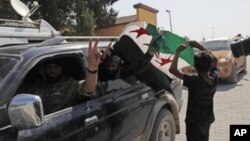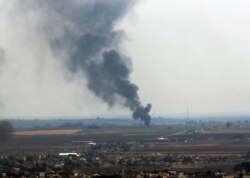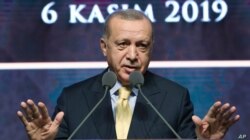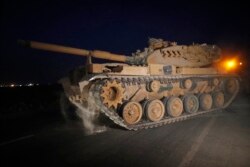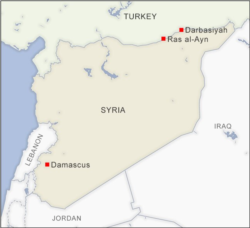The New York-based Human Rights Watch claims it has "damming evidence" showing the Turkish-backed Syrian National Army is engaged in summary executions, pillaging, seizing properties, and preventing the return of people to their homes.
"Turkey is turning a blind eye to the reprehensible behaviors displayed by the factions it arms," said Sarah Leah Whitson, Middle East director at Human Rights Watch. "So long as Turkey is in control of these areas, it has a responsibility to investigate and end these violations."
Last month Turkish forces and the SNA launched an offensive in northeast Syria against Syrian Democratic Forces, which are made up mainly of the Kurdish militia the YPG.
Ankara considers the YPG terrorists, but the militia was a crucial ally of Washington's military effort against Islamic State.
HRW cites evidence that the SNA executed prisoners, seized the homes of local Kurds, and engaged in indiscriminate shelling of civilians.
The case of Hevrin Khalaf, a prominent women's rights activist, is highlighted. In October, Khalaf was executed after her car was stopped by a militia affiliated with the SNA.
HRW also says social media postings of videos put up by the militia appear to show the execution of women prisoners.
Ankara has so far not responded to the HRW report. But Turkish President Recep Tayyip Erdogan has praised the SNA for its "sacrifices" in Syria.
Turkey is facing growing international criticism for its use of militias, which critics claim have links to radical Islamic groups, a charge denied by Ankara.
"The problem is that those people are radicals in terms of their ideology, this is criticized by the western world," said international relations professor Huseyin Bagci of Ankara's Middle East Technical University.
"But Turkey has done it in the last eight years, so this is a choice by the president. He takes the risk. He lets them fight on the side of the Turkish army. We will see if it's like a hand grenade exploding in his hand or it will strengthen his position," Bagci added.
The SNA force is around three times larger than Turkish armed forces engaged in northern Syria. Ankara's reliance on the SNA comes as its armed forces are facing an unprecedented number of simultaneous military commitments.
"The Turkish army is already strained," said retired Turkish general Haldun Solmazturk, who now heads the Ankara-based 21st Century Turkish Institute. "From Iraq to Idlib to eastern Mediterranean Cyprus. An additional burden will have some serious impact on the Turkish army to meet all these challenges."
The SNA has also taken the brunt of casualties. As of November 15, 224 killed and 692 injured compared to Turkish forces casualties of 11 dead and 90 wounded. Some analysts claim the relatively low number of Turkish deaths is a reason why the operation continues to enjoy strong domestic support among the Turkish public.
Ankara's heavy use of SNA forces made up of mainly Syrian Arabs is also widely seen as a tactic to dispel allegations Turkish forces are invading another country.
Analysts point out, given that Turkey once ruled the region when it was the Ottoman Empire, Arab nations remain nervous about any irredentist Turkish aspirations. The Arab League has strongly condemned the Turkish operation.
Ankara insists it is committed to Syria's territorial integrity.
"Our operations in northern Syria aim to clear terrorists from their strongholds, create safe conditions for the return of refugees robbed of their homes & lands," tweeted Fahrettin Altun, the Turkish president's communications head.
"Kurdish groups have forced many Arabs from their homes in areas under their control in northern Syria," said former Turkish ambassador Mithat Rende. "These towns and cities controlled by Kurds are Arab towns with Arab names, with Kurdish minorities."
Erdogan claims up to two million Syrians who fled to Turkey to escape the civil war will be returned to a so-called "safe zone," that is being created in northern Syria along the Turkish border.
The Turkish president is looking to the international community for funding to pay $20 billion for the building of hundreds of thousands of new homes in the "safe zone."
Next week Erdogan will press his case when he is scheduled to hold a meeting with French, German, and British leaders on the sidelines of the London NATO summit.
"We invite the international community to support us in helping our Syrian brothers and sisters to safely return to areas where they can live in peace regardless of their religious and ethnic identities," tweeted Altun Wednesday.
However, the actions of SNA forces are seen as fueling accusations Ankara is seeking to remove local Kurdish populations and replace them with Arabs considered more sympathetic to Turkey.
"There weren't many mistakes by the Turkish army, but there was a tactical mistake when it comes to public diplomacy in the communication," said former senior Turkish diplomat Aydin Selcen who served widely in the region. "It's a fact some of these militias have committed crimes, and this is being used against Turkey, that it's involved in ethnic cleansing."
Ankara vehemently denies any intention that it's seeking demographic changes in Syria. However, the latest findings by HRW can only add to questions over Turkey's plans for a safe zone and mass return of Syrians.
"Executing individuals, pillaging property, and blocking displaced people from returning to their homes is damning evidence of why Turkey's proposed 'safe zones' will not be safe," said Whitson.




